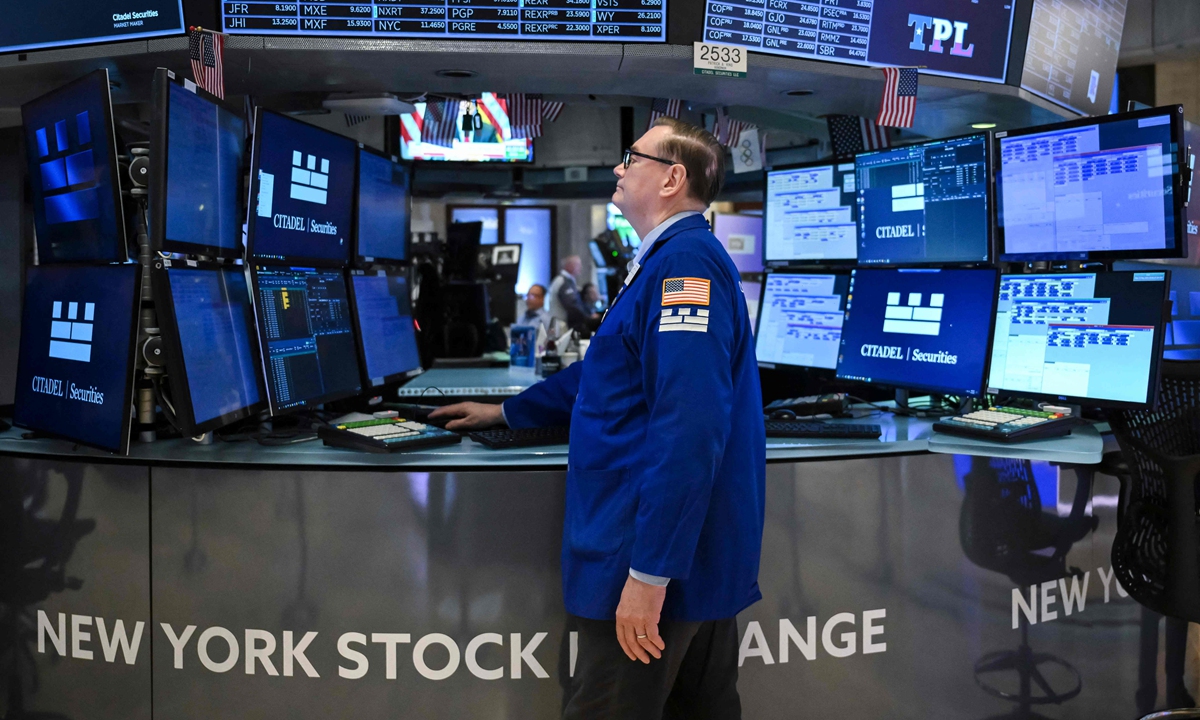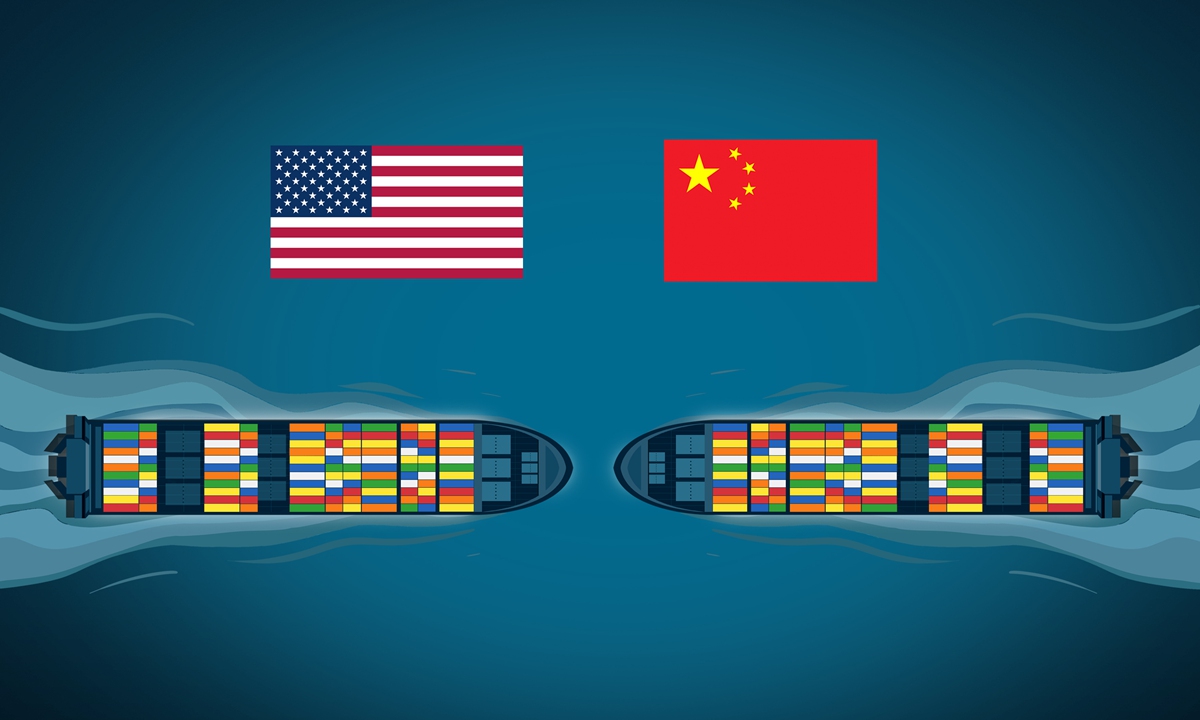China moves to adjust tariffs on US goods on Wednesday following trade talks
US should seek dialogue with China based on equality: FM on next stages of China-US talks

Traders work on the floor of the New York Stock Exchange (NYSE) at the opening bell on May 12, 2025, in New York City. US stocks roared back on Monday local time after the US and China agreed to temporarily slash tariffs following negotiations over the weekend in Switzerland, according to CNBC. Photo: VCG
The Customs Tariff Commission of the State Council announced on Tuesday that starting from Wednesday, it will reduce the additional tariffs on articles of the United States set forth in Announcement of the Customs Tariff Commission of the State Council No. 4 of 2025, from 34 percent to 10 percent, suspending 24 percentage points of that rate for an initial period of 90 days.
It will remove the modified additional tariff measures on those articles imposed by the No. 5 and No. 6 announcements issued earlier by the Customs Tariff Commission of the State Council.
This significant reduction in bilateral tariffs between China and the US aligns with the expectations of producers and consumers in both countries, and is conducive to China-US economic and trade exchanges and global economy, the Customs Tariff Commission of the State Council said.
When asked whether he could share more details on the next stages of China-US trade talks - specifically what issues would be discussed and what talks are planned on the fentanyl issue given that the 20 percent tariffs linked to that remain in place, Lin Jian, spokesperson from China's Foreign Ministry, said on Tuesday that if the US truly wants to cooperate with China, it should stop vilifying and shifting the blame on China, and seek dialogue with China based on equality, respect and mutual benefit.
Lin said China's competent authorities have released information on the China-US high-level meeting on economic and trade affairs. As for the fentanyl issue, China has made it clear more than once that fentanyl is the US' problem, not China's. It's the US' responsibility to solve the issue. Despite the goodwill China has shown, the US wrongly slapped tariffs on Chinese imports by citing the issue of fentanyl. The move has dealt a heavy blow to China-US dialogue and cooperation on counternarcotics, and gravely hurt China's interests, the spokesperson noted.
Lin's remarks also came after a two-day China-US high-level meeting on economic and trade affairs in Geneva achieved substantial progress by significantly reducing bilateral tariff levels to easing trade tensions between the world's two largest economies.
The US will remove a total of 91-percent additional tariffs on Chinese products and China will accordingly cut 91-percent countermeasure additional tariffs against US imports. The US will suspend a 24-percent "reciprocal tariff" and China likewise will suspend a 24-percent countermeasure tariff, according to China's Ministry of Commerce.
Follow-up actions
The White House issued an executive order on Monday to adjust tariffs on low-value imports from China beginning May 14, reversing previously planned rate hikes.
According to the presidential executive order titled "Modifying Reciprocal Tariff Rates to Reflect Discussions with the People's Republic of China," the White House will amend the Harmonized Tariff Schedule of the United States effective at 12:01 am EDT on May 14. The changes include reducing certain China-related duties from 120 percent to 54 percent, starting from May 14 and removing the $200 postal item duty provision originally set to take effect on June 1, with a flat fee of $100 to remain.
The adjustment reflects meaningful progress following the initial phase of China-US negotiations and should reasonably apply to low-value parcels as part of the broader agreement, He Weiwen, a senior fellow at the Center for China and Globalization, told the Global Times on Tuesday.
Zhou Mi, a senior research fellow at the Chinese Academy of International Trade and Economic Cooperation, said on Tuesday that the move sends an important signal - a step back from the previous round of tariff escalation.
"The adjustment likely reflects mounting pressure from rising costs and supply chain disruptions in the US," he said, adding that the development offers a degree of confidence to those engaged in bilateral trade.
Lucas Zheng, founder of US-based logistics information provider Samezip, told the Global Times on Tuesday that the drastically slashed tariff rate is a definite boon for the cross-border e-commerce industry as people could use the precious window to replenish their stocks and make plans in advance.
Related market participants are examining the follow-up situation after the announcement of China-US tariff modification measures.
"From Sunday night to 2 pm on Tuesday, seven American clients, who are all longtime customers, have reached out to our company," Zhang Bin, director of the trade department of the Shandong Silver Phoenix Co, told the Global Times on Tuesday. Among them, there are clients placing new orders, as well as those who had previously ordered but had not had their products shipped due to tariff concerns.
According to Zhang, products currently in storage will be shipped as soon as possible. For new orders, the shipping deadline is within 90 days, aligning with the 90-day pause outlined in the recent joint statement on China-US economic and trade meeting in Geneva.
Global response
"We welcome the direct dialogue on trade that we saw between China and the US over the weekend in Switzerland. It's very positive for the world economy, and we've always said that we don't need any escalation in the trade war," an UN spokesperson said commenting on China-US trade talk and the decision by the two sides to lower tariffs together, according to a press release transcript dated on May 12.
"We need dialogue," the spokesperson said. "I think the Secretary-General [Antonio Guterres] has been very clear that no one wins in a trade war. And as you know, I think the theme of the idea of decoupling is one that has troubled him, and that he has raised on a number of issues."
The EU welcomes the decision of the US and China to pair back their tariff war while the two countries negotiate a deal, the Wall Street Journal reported on Monday, citing a European Commission spokesperson said.
"We do welcome the fact that the US and China have announced that to some extent at least, they will roll back the imposition of tariffs for 90 days," Olof Gill, a spokesperson for the Commission, said on Monday.
On Tuesday, JPMorgan Chase & Co. boosted its forecast for US economic growth. "The administration's recent dialing down of some of the more draconian tariffs placed on China should reduce the risk that the US economy slips into recession this year," JPMorgan Chief US Economist Michael Feroli said Tuesday in a note, according to Bloomberg.
Goldman Sachs Group Inc. and other major banks also boosted their growth forecasts for China's economy, citing a temporary deal with the US to de-escalate their trade conflict, according to Bloomberg.
Much more work to be done
Despite the progress, Zhou noted that optimism should remain measured, as tariff levels are still relatively high despite the reduction.
The Port of Long Beach in California held a press conference on Monday, the Press-Telegram, a daily newspaper published in Long Beach, reported. According to the report, it could take weeks or even months, however, to untangle the backlog and stabilize the system, city and port officials said. The consequences of tariffs on imports from China are already being seen at the port and also impacting jobs, said Mario Cordero, CEO of the Port of Long Beach.
"It's welcome news that these guys are talking and that the numbers have been pulled down from those sky-high levels," said Gene Seroka, executive director of the Port of Los Angeles - the busiest US seaport and the No.1 gateway for ocean imports from China. He was referring to the tariff rates, according to Reuters. "There's still much more work," Seroka said, adding that 30 percent tariffs on goods for the world's leading export nation remain significantly higher than before, Reuters reported.
Zhou said the two economic powers, China and the US, have a broad and mutually beneficial cooperative relationship in their own right, and the reduction of uncertainty through negotiations is beneficial to both sides.
Moreover, the fact that the two countries manage their differences through negotiations is also what the rest of the world expects from China-US economic and trade relations, believing that cooperation between these two countries can bring more benefits to them.
"China is a responsible country, and we look at international economic and trade relations in accordance with the multilateral rules. Hopefully the US will be guided by multilateralism in further exchanges with China to promote further consensus between the two sides," Zhou noted.

